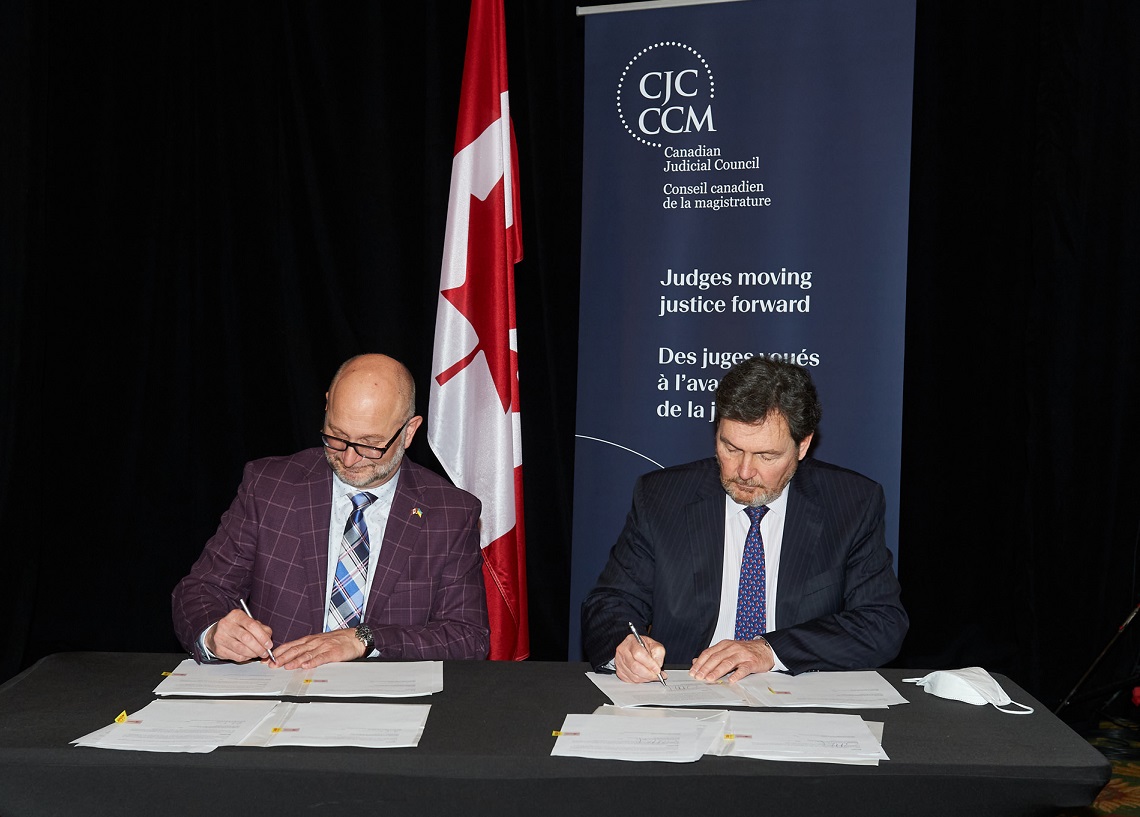Canadian Judicial Council reports on its semi-annual Spring Meeting
After two years of meetings by videoconference because of the pandemic, Canada’s chief justices and associate chief justices were pleased to come together in person this past week for their 2022 semi-annual Spring meeting. While recognizing the importance and benefits of meeting in person, strict measures were put in place throughout the week to ensure the health and safety of all attendees.
Prior to their meeting, Council members attended a Leadership Seminar that addressed issues of technology, health and wellness, media relations and judicial independence. The Council then met for three days and discussed a number of important issues, including:
- technology in the courts; of note, Council members lauded the recent investments in digital technology that emerged from the pandemic and resolved to ensure that momentum in this area not be lost.
- the Council’ governance structure; in the spirit of renewal and ensuring that the work of Council Committees remains focused, members engaged in a dialogue about respective terms of reference, membership and roles.
- judicial education and new learning tools available to judges.
- the expectation that Chief Justices and Associate Chief Justices should, after ten (10) years of service, reflect on the duration of their term.
Council expressed deep concern for the increasing direct attacks on the Rule of Law and independence of the judiciary including, most recently in Ukraine where Canadian judges have proudly worked on various judicial reform projects since 1996, as well as similar attacks in Afghanistan and in other countries around the world.
Members heard from the Minister of Justice and Attorney General of Canada, as well as from the Commissioner for Federal Judicial Affairs, on matters of interest to the judiciary, including the renewed hope that judicial conduct reforms under Bill C-9 will be adopted soon.

A key output of the meeting was the signing by the Minister and the Chairperson of Council of two Memoranda of Understanding.
- The MoU on judicial governance, which recognizes that the principle of judicial independence includes the independence of the Council in fulfilling its mandate to serve the public. This MoU also advances transparency by setting out key provisions relating to funding requests and the essential role of the Council in the appointment of the Commissioner for Federal Judicial Affairs, who is responsible for supporting the Council’s operations.
- The MoU on judicial education, which establishes how the federal government and the Council engage with one another, in this regard, while honouring constitutional boundaries required by judicial independence and the separation of powers. The MOU recognizes that judicial education is an essential element of Canada’s justice system, that Canada is an international leader in this field, and that initiatives concerning judicial education must be undertaken in a manner that respects judicial independence and embodies transparency and accountability to the public.

“These Memoranda of Understanding are concrete measures that provide safeguards for judicial independence. By endorsing these two documents, the judiciary and the Government recognize that judicial independence is a fundamental principle, which is vital to maintaining public confidence in the administration of justice in Canada”, said the Chief Justice of Canada and Chairperson of the Council, the Right Honourable Richard Wagner.
The Honourable David Lametti, Minister of Justice and Attorney General of Canada added: “These MOUs are important steps taken by the executive and judicial branches of government in reaffirming the independence of the Canadian Judicial Council. They represent a joint commitment by the Government and the Council to public accountability and to judicial independence, both essential for public confidence in the courts and respect for the Rule of Law.”
The Council meeting concluded with the Chief Justice of Canada thanking all members of the judiciary, court personnel and other stakeholders for their ongoing efforts during the pandemic to preserve and enhance public confidence in the administration of justice.
Links:
- MOU on the Governance of the Canadian Judicial Council
- MOU on the Continuting Education of Superior Court Judges
Contact:
Johanna Laporte
Director of Communications
info@cjc-ccm.ca


